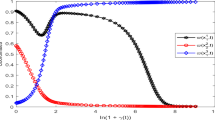Abstract
Probability theory is the standard economic representation of uncertainty, although it is not always an accurate one. Fuzzy logic is an alternative representation that does not require individual beliefs regarding the explicit functional form of uncertainty. This paper applies fuzzy logic to an oligopoly trigger pricing game. The fuzzy trigger pricing game reverses the standard cyclical price war prediction; collusion-sustaining price wars are most likely to occur during times of high demand. The fuzzy model also predicts that markets with relatively volatile prices are more likely to undergo collusion-sustaining price wars. The predictions are consistent with available empirical evidence.
Similar content being viewed by others
References
Benaroch, Michel (1996) ‘Artificial Intelligence in Economics: Truth and Dare’, Journal of Economic Dynamics and Control, 20, 601–5.
Bresnahan, Timothy F. (1987) ‘Competition and Collusion in the American Automobile Industry: The 1955 Price War’, Journal of Industrial Economics, 35, 457–82.
Butnariu, Dan (1979) ‘Solution Concepts for n-Person Fuzzy Games’, in Madan M. Gupta, Rammohn K. Ragade and Ronald R. Yager (eds.), Advances in Fuzzy Set Theory and Applications. Amsterdam: North-Holland Publishing Company. pp. 339–360.
Domowitz, Ian, R. Glenn Hubbard and Bruce C. Peterson (1986) ‘Business Cycles and Oligopoly Supergames: Some Empirical Evidence on Prices and Margins’, Working Paper No. 2057. Cambridge MA: National Bureau of Economic Research.
Dompere, Kofi Kissi (1995) ‘The Theory of Social Costs and Costing for Cost-Benefit Analysis in a Fuzzy Decision Space’, Fuzzy Sets and Systems, 76, 1–24.
Driankov, Dimiter, Hans Hellendoorn and Michael Reinfrank (1994) An Introduction to Fuzzy Control. Berlin: Springer-Verlag.
Fedrezzi, Mario, Michele Fedrezzi and Walenty Ostasiewicz (1993) ‘Towards Fuzzy Modeling in Economics’, Fuzzy Sets and Systems, 54, 259–68.
Friedman, James W (1971) ‘A Non-cooperative Equilibrium for Supergames’, Review of Economic Studies, 28, 1–12.
Fudenberg, Drew and Jean Tirole (1991) Game Theory, Cambridge: MIT Press.
Green, Edward J. (1983) ‘A Study of Cartel Stability: The Joint Executive Committee, 1880–1886’, Bell Journal of Economics, 14, 301–14.
Green, Edward J. and Porter, Robert H. (1984) ‘Non-Cooperative Collusion under Imperfect Price Information’, Econometrica, 52, 87–100.
Greenhut, John G., M. L. Greenhut and Yusuf Mansur (1995) ‘Oligopoly and Behavioral Uncertainty: An Application of Fuzzy Set Theory’, Review of Industrial Organization, 10, 269–88.
Jamshidi, Mohammad, Nader Vadiee and Timothy Ross eds. (1993) Fuzzy Logic and Control: Software and Hardware Applications. Englewood Cliffs: Prentice Hall.
Mansur, Yusuf (1995) Fuzzy Sets and Economics: Applications of Fuzzy Mathematics to Non-Cooperative Oligopoly, London: Edward Elgar Co.
Rotemberg, Julio J. and Garth Saloner (1986) ‘A Supergame-Theoretic Model of Price Wars during Booms’, American Economic Review, 76, 390–407.
Suslow, Valerie Y. (1988) ‘Stability in International Cartels: An Empirical Survey’, Domestic Studies Program, Hoover Institution, Stanford University, Working Papers in Economics E–88–7.
Zadeh, Lotfi A. (1983) ‘A Computational Approach to Fuzzy Quantifiers in Natural Languages’, Computers and Mathematics with Applications, 9, 149–84.
Zadeh, Lotfi A. (19??) ‘Fuzzy Sets and Information Granularity’, in Madan M. Gupta, Rammohn K. Ragade and Ronald R. Yager, eds, Advances in Fuzzy Set Theory and Applications. Amsterdam: North-Holland Publishing Company. pp. 3–18.
Author information
Authors and Affiliations
Rights and permissions
About this article
Cite this article
Goodhue, R.E. Sustaining Collusion Via a Fuzzy Trigger. Review of Industrial Organization 13, 333–345 (1998). https://doi.org/10.1023/A:1007796509603
Issue Date:
DOI: https://doi.org/10.1023/A:1007796509603



